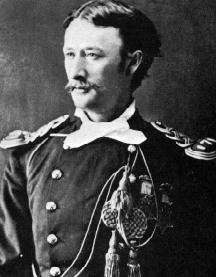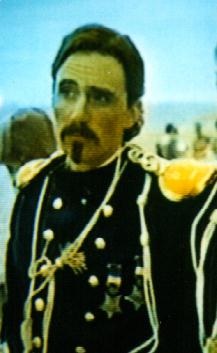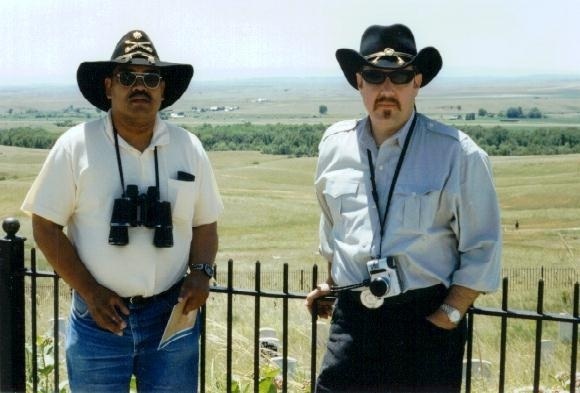




Rank, duty position and unit at time of action:
Second Lieutenant, Company B 6th Michigan Cavalry, 3rd Cavalry Division
War:
Civil War
Place and date of action:
Sweat House Creek, Virginia, 3 April 1865 and Saylor's Creek, Virginia, 6 April 1965
Portrayed by:

In the film:
And should have been portrayed in the films:
CUSTER, THOMAS W.
Rank and organization: Second Lieutenant, Company B, 6th Michigan Cavalry. Place and date: At Namozine Church, Va., 10 May 1863. Entered service at: Monroe, Mich. Birth: New Rumley, Ohio. Date of issue: 3 May 1865. Second award. Citation: Capture of flag on 10 May 1863.
SECOND AWARD
Place and date: At Sailor Creek , Va, April 1865. Date of issue: 26 May 1865. Citation: 2d Lt. Custer leaped his horse over the enemy's works and captured 2 stands of colors, having his horse shot from under him and receiving a severe wound.
Tom Custer was the only soldier in the Civil War to receive the Medal of Honor twice for separate actions. (Approximately a dozen men did so during the period of the Indian Wars between the Civil War and the Spanish American War; Major Smedley Butler of the Marine Corps received medals for action in the campaign in Vera Cruz, Mexico in 1914 and in Haiti in 1915; five Marines, serving under the Army chain of command at Belleau Wood, France in World War I each got both the Army and Navy versions of the medal for the same action.) Twice during the Appomattox campaign, Tom Custer led his troops in charging, on horseback, heavily entrenched Confederate infantry positions, personally seizing the enemy colors and taking several prisoners. (The date of 1863 in the above citation is a clerical error.) On the second occasion, he was shot in the face, but was so determined to continue fighting that his division commander had him put under arrest just to get him to a field hospital. As the only man to receive the Medal of Honor twice for separate actions, he was therefore the highest-decorated soldier of the Civil War and was to the Civil War what Alvin C. York was to World War I and Audie L. Murphy was to World War II.
He made a career of the Regular Army after the Civil War, rising to the permanent rank of Captain and brevet (honorary) rank of Lieutenant Colonel. His death in action against the Sioux and Cheyennes at the Little Bighorn River in Montana in June 1876 (appropriately depicted in Son of the Morning Star) and the subsequent mutilation of his body (too gruesome to be detailed here, but his remains were recognizable only from a distinctive tattoo with his initials on his arm) were the ultimate tragedy and indignity for a hero of his stature. In order to grasp the magnitude of that indignity, one should imagine that Alvin York had also made a career of the Army and had been beaten and beheaded by the Japanese during the Bataan Death March, or that Audie Murphy's National Guard unit had been mobilized for the Korean War and that he ended up being killed and mutilated by the Communist Chinese on Pork Chop Hill. There is one sad and simple reason that very few people have ever heard of Thomas Ward Custer, let alone his heroic acts: he literally lived and died in the shadow of his older brother who was his division commander in the Civil War and regiment commander after the postwar demobilization, Lt Col (Brevet Major General) George Armstrong Custer.
This is not a criticism of Son of the Morning Star, which is the only film in which Tom Custer was ever depicted; the scope and time span of the film was limited (as was the original book by Evan S. Connell) to the post-Civil War experiences of the Custer brothers. There is a scene which covers his status as a Medal of Honor recipient nicely: after the two brothers playfully wrestle inside a tent in the field, Armstrong (played by Gary Cole) has Tom in a headlock and asks, "You think you should've been the General?" To which Tom smirks, "I didn't have to be a General! I got all the medals!"
The blown opportunity here was not on the part of the producers of Son of the Morning Star, but on the part of Hollywood in general: while Tom Custer's Civil War heroism was worthy of a film of the magnitude of Sergeant York and To Hell and Back, except for a passing mention in the "alternate history" TV movie The Court Martial of George Armstrong Custer, none of the remainder of the vast array of films about Armstrong even mentions the existence of younger brother Tom. This is a particular failing of the films They Died With Their Boots On, starring Errol Flynn and Custer of the West, starring Robert Shaw, which devoted substantial time to George Armstrong Custer's Civil War experiences.
